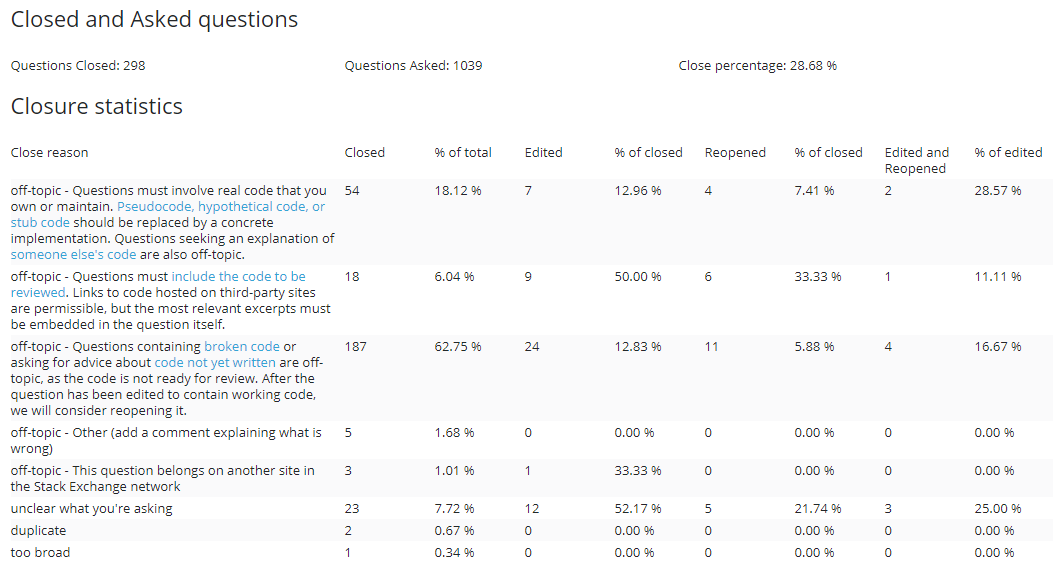We have some history, shown below, with our close reasons, there are some problems we have with them. And there has been a consensus to rework them for a while now.
The latest I heard about this was in 200_success' message:
It's time to revisit our standard close reasons. The last initiative failed due to a poor process. I'll think about how to kick off the new discussion.
Since this was posted 2017-11-21, two months ago, I want to know if the moderators, and our community, have thought of ways to tackle the problems with our previous process.
The current close reasons are:
- Questions containing broken code or asking for advice about code not yet written are off-topic, as the code is not ready for review. After the question has been edited to contain working code, we will consider reopening it.
- Questions must involve real code that you own or maintain. Pseudocode, hypothetical code, or stub code should be replaced by a concrete implementation. Questions seeking an explanation of someone else's code are also of-topic.
- Questions must include the code to be reviewed. Links to code hosted on third-party sites are permissible, but the most relevant excerpts must be embedded in the question itself.
Below is a time line of changes, and requested changes, of the close reasons. They're listed below to make looking up information easier, and so users that haven't followed this before don't have to search meta to understand what's happened, and when.
status-completed Revising list of closure reasons
The close reasons were re-worded to be based on the top voted answer on this question. The close reasons also haven't changed much since. These were implemented on 2014-04-02, with a couple of tweaks to the wording on 2014-04-07.
status-declined Rewording close reason “Explanation of code”
Asks to change the close reason sentence "Questions seeking an explanation of someone else's code are off-topic" to "Questions seeking an explanation of code are off-topic".
The accepted answer says that's not what the close reason is about.
The top voted answer says that the wording should be changed.
The close reasons were slightly changed, on 2014-10-16, to have better links to My question was closed as being off-topic. What are my options?
status-declined Should we do away with “someone else's code” wording?
Asks the same as the above. The top voted answer also says this should be changed.
This however was status-declined in favour of revising the standard off-topic reasons.
Should the “broken code” close reason be reworded?
This says that the current 'groups' of close reasons are confusing. I however can't write a short synopsis.
How should we revise the standard off-topic reasons, if we can have up to five?
This lists a lot of proposals for how to change the close reasons if you can have three to five close reasons.
I'm unsure why we didn't change to these close reasons.
[chat] We can't have more than three close reasons:
Community Managers pushed back. We would have to build a stronger case if we wanted more than three.
Is our “broken” wording broken?
We came to the conclusion, that whether you agree or disagree that it's broken, using 'code not working as intended' is better than 'broken'.
[duplicate] Can we do away with “someone else's code” wording?
Closed in favour of completing How should we revise the standard off-topic reasons, if we can have up to five?
[chat] The user that started How should we revise the standard off-topic reasons, if we can have up to five? wants to look into restarting this discussion.
It's time to revisit our standard close reasons. The last initiative failed due to a poor process. I'll think about how to kick off the new discussion.
If you're 10k you can see when the close reasons were changed. And is how I got some of the above dates.
And so we have the result:
- Users want to replace "someone else's code" with just "code".
- We don't want to use "broken code", as it confuses new users. Instead use "code not working as intended".
- We are limited to three close reasons.
- We have a lot of possible ways to group the close reasons. We want to avoid a user posting a duplicate answer first, and no-one else getting upvotes - FGITW.

